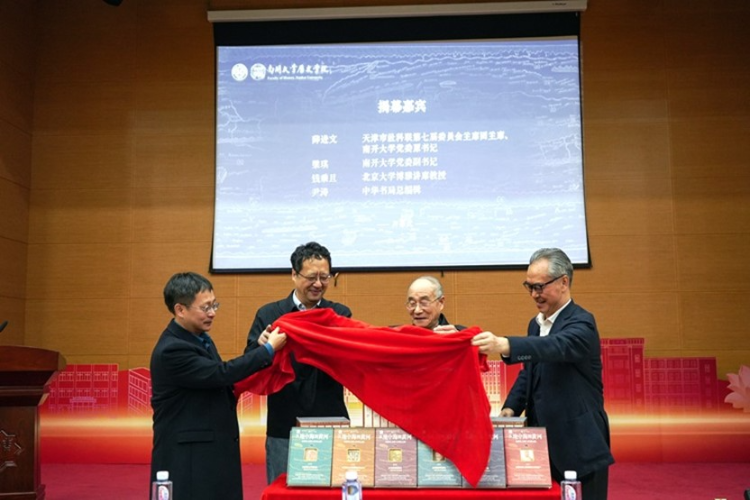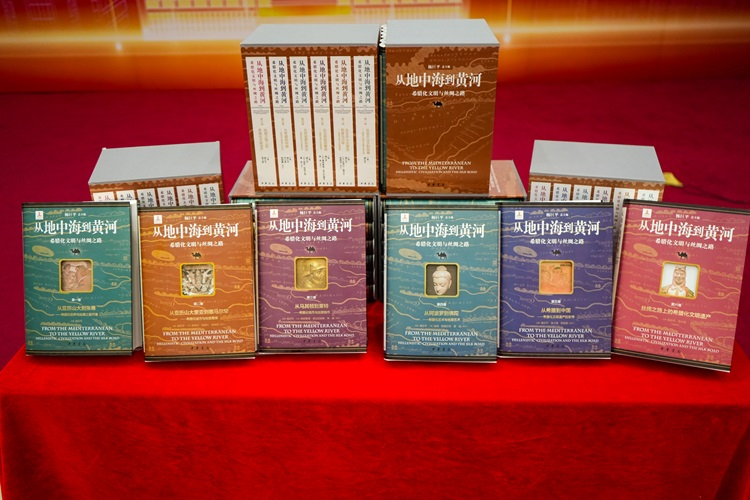The Six-volume Book From the Mediterranean to the Yellow River: Hellenistic Civilization and the Silk Road Released at NKU The Seminar “Review and Prospect of Multidisciplinary Cooperation Research on Silk Road Civilization” Held Simultaneously
Nankai University News Network (Correspondent Gao Yutong, Photographer Zhang Zhihe) The launch ceremony for the new book From the Mediterranean to the Yellow River: Hellenistic Civilization and the Silk Road , which was the results of a major project under the National Social Science Fund of China, a project under the “14th Five-Year Plan” national key publication publishing program, and the results of a project funded by the National Publication Foundation, was held at the central library at Jinnan Campus of Nankai University in the morning of November 9. The six-volume book with over 200,000 Chinese characters, published by Zhonghua Book Company with Yang Juping, a professor at the Faculty of History of Nankai University and director of the Silk Road Ancient Civilization Research Center of Nankai University as the editor-in-chief, is the first academic book that systematically studies the relationship between Hellenistic civilization and the Silk Road.
The book examines the relationship between the Hellenistic world and the Silk Road from the perspectives of ancient world history and global history. Through a thorough examination of the interaction between Hellenistic civilization and its heritage and various civilizations relevant to the Silk Road, this book focuses on the evolution of Hellenistic cities, coins and art to the Silk Road central towns, coins and art, revealing the connections between Hellenistic civilization and the Silk Road in terms of time and space, form and connotations, exchanges and integration, and history and reality. It has also made significant progress in some unknown areas or issues that have been under dispute. It represents the voice of Chinese scholars in the international academic circles. The pragmatic value of this book is significant, because the geographical space discussed in it is as same as largely that covered by China’s Belt and Road initiative in many ways.

In the presence of the guests, Xue Jinwen, Chairman of the Tianjin Federation of Social Sciences and former Secretary of the Party Committee of Nankai University; Liang Qi, Deputy Secretary of the Party Committee of Nankai University; Qian Chengdan, Boya Chair Professor of Peking University; and Yin Tao, Editor-in-Chief of Zhonghua Book Company, jointly unveiled the new book.
Liang Qi addressed a warm welcome to the guests on behalf of the university. He said that Nankai University has an old-established tradition for historical studies, owning prominent experts and researchers. In recent years great progresses have been made in world history studies. It has been selected twice by the Ministry of Education for the construction of first-class disciplines. This symposiun on multidisciplinary cooperation research on Silk Road civilizations is of important theoretical value and practical significance for implementing the Belt and Road Initiative and promoting multicultural exchanges and cooperation between China and the others in the context of globalization.
Yin Tao reviewed the long-term cooperation between Zhonghua Book Company and Nankai University, and introduced the publication of this new book. At the recent Frankfurt Book Fair, Zhonghua Book Company signed a publishing agreement with Springer Nature Group, a world-renowned science and technology publishing organization, to launch an English version of the series of books.
The dean of the Faculty of History of Nankai University, Professor Yu Xinzhong, introduced the main developments made by the Faculty in the construction of the discipline of world history in recent years, saying that the faculty will further contribute high-quality academic achievements and forward-looking theoretical thoughts to the history study in China.

The book From the Mediterranean to the Yellow River: Hellenistic Civilization and the Silk Road is the result of the major project “Hellenistic Civilization and the Silk Road” funded by the National Social Science Fund of China and presided over by Yang Juping. Written by over 40 Chinese and foreign scholars over 10 years, the book consists of six volumes: From Alexander to Zhang Qian: The Hellenistic World and the Opening of the Silk Road, From Alexandria to Samarkand: Hellenistic Cities and Important Silk Road Cities, From Macedonia to Sogdiana - Hellenistic Coins and Silk Road Coins, From Apollo to the Buddha: Hellenistic Art and Silk Road Art, From Greece to China: The Eastward Transmission of the Legacies of Hellenistic Civilization , and Hellenistic Civilization legacies on the Silk Road.
Huang Yang, chairman of the China Society of the Ancient World Studies and a professor at Fudan University, spoke highly of the academic value of this series, saying that this landmark work applies new research paths, methods and means to the study of Chinese history and world history from a global perspective, which blazes a trail for the study of ancient world history in China.
Qian Chengdan said that the publication of this book is of milestone significance, because the book, combining the study of the Silk Road and the Mediterranean world, opens a new field of study for the discipline of world history.
More than 10 experts and scholars gave speeches, including Rong Xinjiang, Boya Chair Professor of Peking University; Li Jianming, a professor at Fudan University; Guo Xiaoling, a professor at Beijing Normal University and former Director of the Capital Museum; Yang Gongle, a professor at Beijing Normal University; Chen Heng, a professor at Shanghai Normal University; Mu Tao, a professor at East China Normal University; Yan Shaoxiang, a professor at Capital Normal University; Yu Dianli, former Deputy General Manager of China Publishing Group Co., Ltd.; Xu Zairong, a researcher at the Institute of World History of the Chinese Academy of Social Sciences and deputy editor-in-chief of World History; Zhang Qiang, Director of the Institute for the History of Ancient Civilizations of Northeast Normal University; Zhou Gonggu, a professor at Northeast Normal University; Cai Lijuan, a professor at Central China Normal University; Li Yongbin, a professor at Capital Normal University; and Chair Professor Chen Zhiqiang and Professor Yang Dongliang of Nankai University. The participants agreed that the series of books, which represents interdisciplinary research from a new perspective, fills a gap in the field, and enhances the international influence of Chinese research on world history, and has profound historical and practical significance.

At the launch, Yang Juping expressed thanks to Zhonghua Book Company and the guests, saying that the six-volume book is the result of decade-long cooperation among the team members from China and abroad, and benefits from the long-term specialized research carried out by the scholars. As a result of Alexander’s Eastern Conquest and the founding of the Hellenistic world and the managing and planing of Emperor Wu of the Han Dynasty for the Western Regions and Zhang Qian’s mission to Central Asia, the ancient Chinese and Greek civilizations met in Central Asia, linking the two original civilizations of the East and West in the Eurasia together. It is a miracle in the history of exchanges and mutual learning among world civilizations, and is worthy of summary and research by Chinese scholars.Through videoes, the team's academic advisors, Prof. Liu Jiahe of Beijing Normal University, Prof. Wang Dunshu of Nankai University, and two important members, Prof. Peter Stewart of Oxford University and Prof. Frank Holt of the University of Houston, expressed warm congratulations on the publication of the book and praised it for its global perspective and for being a model of successful international cooperative research.
At the symposium, “Review and Prospect of Multidisciplinary Cooperation Research on Silk Road Civilization” , nearly 100 scholars from universities, academic institutions and publishing circles discussed deeply and thoroughly the topics such as the history of the Silk Road, Silk Road art, Silk Road cultural exchanges, relationship between ancient civilization and the Silk Road, etc.
(Edited and translated by Nankai News Team.)









